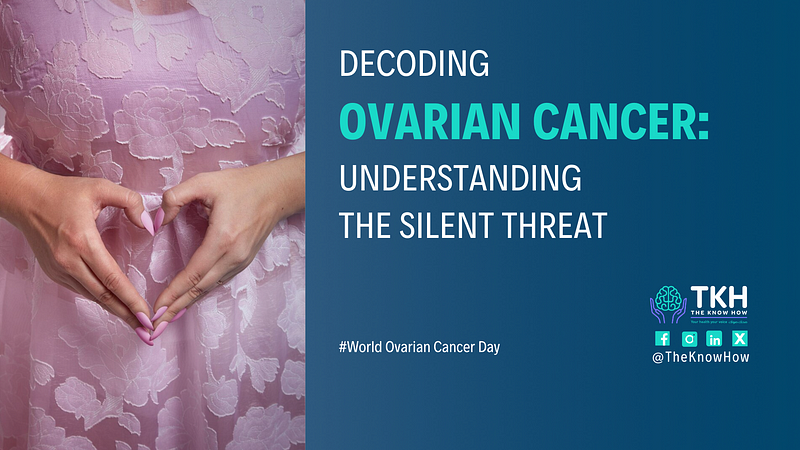

Ovarian cancer is the most lethal of the female cancers. Knowing the symptoms could save life.
@TheKnowHow
Decoding Ovarian Cancer: Understanding the Silent Threat
Established in 2013 by a group of leaders from ovarian cancer advocacy organizations around the world, on World Ovarian Cancer Day each year voices raise in solidarity in the fight against ovarian cancer. Awareness is paramount, knowledge might save lives.

What is Ovarian Cancer?
Ovarian cancer’ is an umbrella term for a multitude of different types of cancer that affect the ovaries, but also other parts of the female reproductive within the tummy area called the pelvis. There are more than 30 different types of ovarian cancer known so far classified by the types of cells and tissue they start from. On its own subtype, most of them are rare diseases. Taken together, however, ovarian cancer is the most lethal of the female cancers. Ovarian Cancer can arise at any age, but risk increases for females over the age of 50. Some types of this aliment are hereditary and require genetic testing within the family also.

Ovarian cancer: Does regular smear test protect me?
Cervical screening test (also known as a smear test) known to and performed by a lot of females recognizes early signs of cervical cancer. However, it can´t detect ovarian cancer. So far, there is no reliable screening test.
Unfortunately, by the time most ovarian cancer patients consult a doctor, around 70% have an advanced tumor that is no longer localized to the ovary. This is because the symptoms of ovarian cancer are vague and sometimes confused with other, less serious illnesses, and patients may endure them for months before seeking treatment. With the delay in diagnosis, advanced cancer becomes more difficult to treat.
An international system of staging called FIGO (Fédération Internationale de Gynécologie et d’Obstétrique) classifies how far the cancer has spread. This involves image scans, examination during surgery and taking some samples of tissue. Grading refers to how similar cancer cells look to normal cells. It helps to predict how fast the tumor is likely to grow and spread. Staging and grading is an important part of diagnosis because it affects the treatment options.

Ovarian cancer: When should I get active?
Knowing the symptoms of ovarian cancer could save your or your loved ones life. Take action when unclear symptoms arise:
Take action when unclear symptoms arise:
- Persistent bloating, or any unusual bleeding from the vagina before or after the menopause
- Feeling full quickly and/or loss of appetite
- Pain from your tummy to the top of your thighs
- Needing to wee more urgently or more often than usual Occasionally, there may be other symptoms like:
- Changes in bowel habit, e.g. diarrhea or constipation
- Changes in bowel habit, e.g. diarrhea or constipation
- Feeling very tired
- Experience unplanned weight loss
The symptoms described above will be:
- New — they’re not normal for you
- Frequent — they usually happen more than 12 times a month
- Persistent — they don’t go away
When you notice one or more of these symptoms, you should consult your gynecologist. While it is not likely that your symptoms are caused by a serious issue, you should have them examined. You may receive a CA125 blood test, or an ultrasound check of your ovaries and tummy.
If your symptoms persist, return to your doctor within two weeks or get a second opinion.

Inherited ovarian cancer: What about my daughter?
After being diagnosed with ovarian cancer, you may be concerned that additional family members are at danger. While cancer is a common illness and it’s not unusual to have more than one family member affected with some cancer type, ovarian cancer can be inherited. In this case, the altered version of this gene will have been inherited from your mother or father and may be passed down to your children. If such genetic variations are identified, it is advised that family members be tested as well. Gene variants increase the likelihood of developing cancer, although they may not always cause it. While ovarian cancer screening of the entire population by blood tumor marker or ovarian ultrasound causes greater harm due to false positive findings, female family members with a genetic risk will benefit from regular gynecology controls.
Over the last few years, new medications have been developed that particularly target ovarian tumors in people with a BRCA1 or BRCA2 gene variation. Genetic testing clarifies whether you may be eligible for a therapy with them.
In addition to the hereditary changes, mutations occur inside the tumor tissue itself. They are not hereditary. Tumor profile testing for these mutations is performed by a pathologist when tumor tissue is retrieved after surgery or biopsy. Tumor mutations can help determine which treatments the tumor is most likely to respond to, as well as if you are eligible for certain treatments or clinical trials.

Advanced Ovarian Cancer: A Patients Story
We found an encouraging patient story for you on the internet today. Sbba received a stage 3c diagnosis. Treatment did not go as planned, but the steadfast support she received, together with her faith that guided her, kept her going.
Her statement to us:
“We must ensure every woman feels empowered about their health, that the taboo around gynecological cancers is dispelled and that everyone has the support that is much needed to get through diagnosis, treatment and recovery.” Sbba’s story | Target Ovarian Cancer
If you need reassurance by an independent second medical opinion, connect with us. Visit us at TheKnowHow.ae.

Comments
Post a Comment